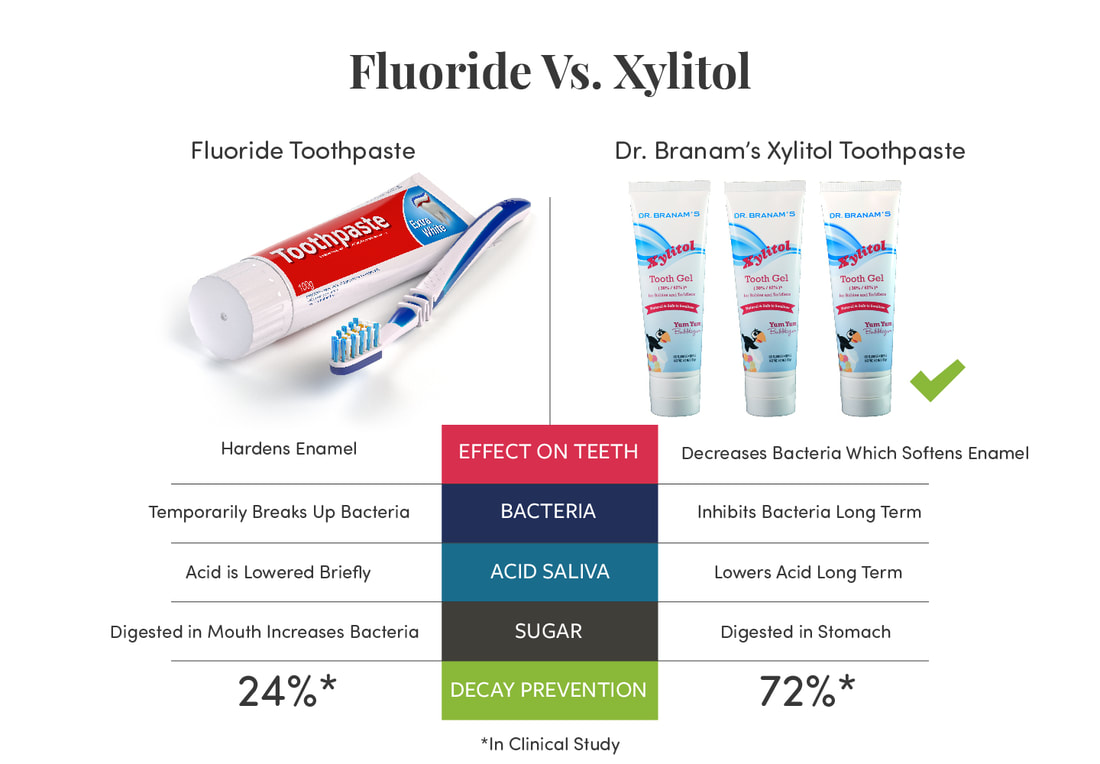Xylitol vs. Fluoride Toothpaste
Which is More Effective?
Fluoride Toothpaste is old technology and only hardens teeth. It does not address the root cause of tooth decay which is bacteria. A university-based clinical trial has proven that by using Dr. Branam's Xylitol toothpaste, children will have 72% less cavity-causing bacteria in their mouths.
The Key Benefits Of Xylitol in Toothpaste
1. Keeps Cavities at Bay: Xylitol is a natural sugar substitute that doesn't fuel cavity-causing bacteria in your mouth. So, while it satisfies your sweet tooth, it's actually helping to keep those pesky cavities away!
2. Promotes Saliva Production: Saliva is your mouth's natural defense against tooth decay, and Xylitol can stimulate saliva production, helping to wash away food particles and neutralize acids that can erode enamel.
3. Reverses Early Tooth Decay: Studies suggest that Xylitol may even help in remineralizing enamel, potentially reversing early stages of tooth decay and keeping your pearly whites, well, white!
4. Diabetic-Friendly: With a low glycemic index, Xylitol is a great alternative for those watching their blood sugar levels. It's metabolized differently than regular sugar, making it a safer choice for people with diabetes.
5. Safe for All Ages: From kids to adults, Xylitol is safe to swallow and well-tolerated. You can find it in gum, mints, toothpaste, and even some oral health products.
2. Promotes Saliva Production: Saliva is your mouth's natural defense against tooth decay, and Xylitol can stimulate saliva production, helping to wash away food particles and neutralize acids that can erode enamel.
3. Reverses Early Tooth Decay: Studies suggest that Xylitol may even help in remineralizing enamel, potentially reversing early stages of tooth decay and keeping your pearly whites, well, white!
4. Diabetic-Friendly: With a low glycemic index, Xylitol is a great alternative for those watching their blood sugar levels. It's metabolized differently than regular sugar, making it a safer choice for people with diabetes.
5. Safe for All Ages: From kids to adults, Xylitol is safe to swallow and well-tolerated. You can find it in gum, mints, toothpaste, and even some oral health products.
Is Xylitol Toothpaste Safe for Kids and Toddlers?
As the benefits of xylitol become more widely known, some mass marketed dental products now contain trace levels of xylitol. A natural ingredient sweetener approved by the FDA in 1963, xylitol is a natural inhibitor of bacteria. When used in therapeutic levels as in Dr. Branam's xylitol products, xylitol can efficiently reduce tooth decay. All Dr. Branam formulations contain 30% of xylitol by volume, which is safe and very effective.
Clinically Proven to Prevent Tooth Decay in Children
In a 2006 American Academy of Pediatric Dentistry study, children whose mothers who chewed xylitol gum 3 months after delivery until their children were 2 years old had a 70% reduction in cavities compared to other groups. Studies have also shown that xylitol chewing gum can help prevent acute otitis media, the most common ear infection in children.
In the U.S., xylitol is approved as a direct food additive for use in foods for special dietary needs. Unlike fluoride, xylitol is safe for babies and toddlers to swallow, allowing it to be both an effective substitute and complement to fluoride in oral care products. The safety of xylitol has been proven in long term clinical studies and has been confirmed by all the major regulatory bodies worldwide.
In the U.S., xylitol is approved as a direct food additive for use in foods for special dietary needs. Unlike fluoride, xylitol is safe for babies and toddlers to swallow, allowing it to be both an effective substitute and complement to fluoride in oral care products. The safety of xylitol has been proven in long term clinical studies and has been confirmed by all the major regulatory bodies worldwide.
CLINICAL STUDIES Click image to read more








